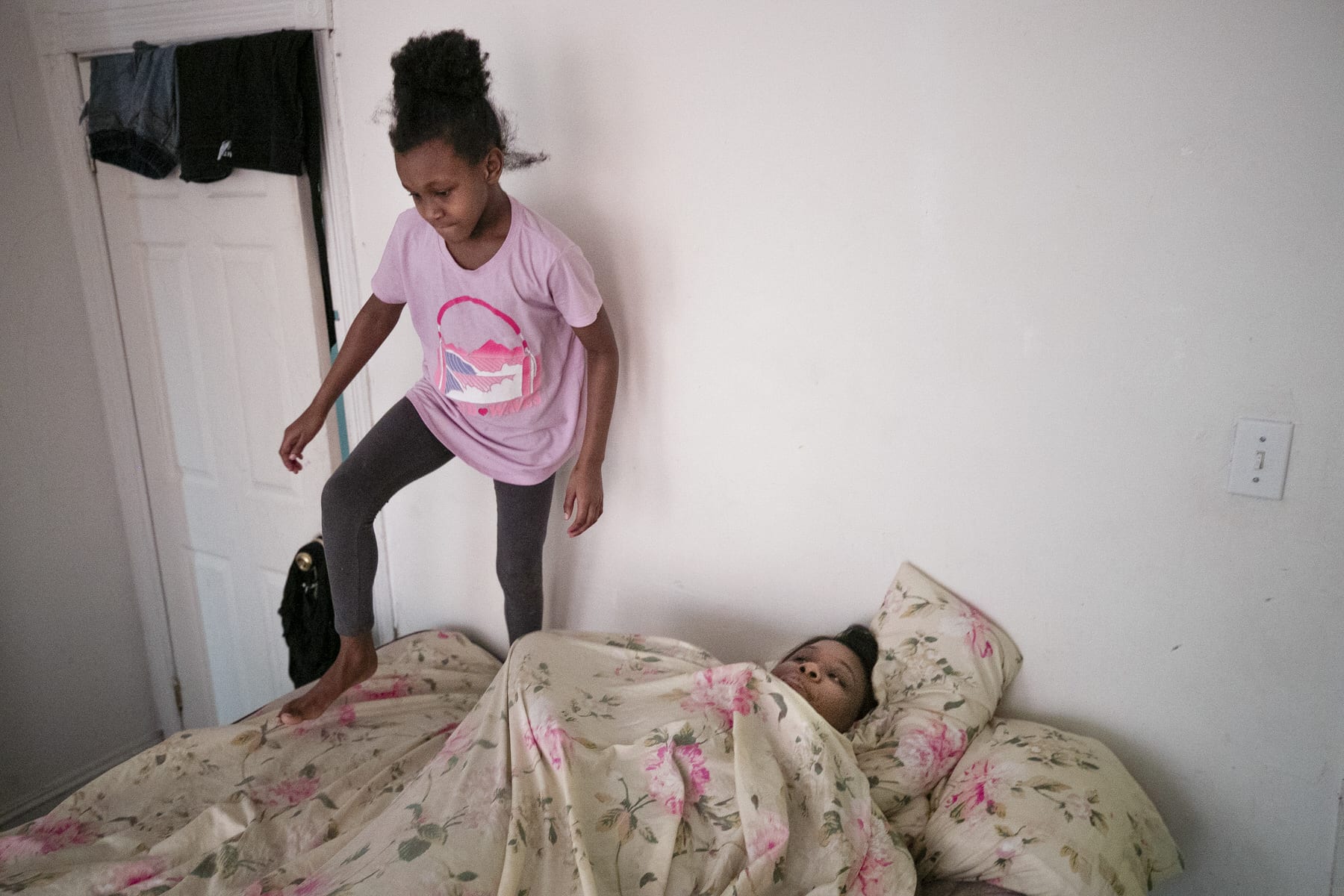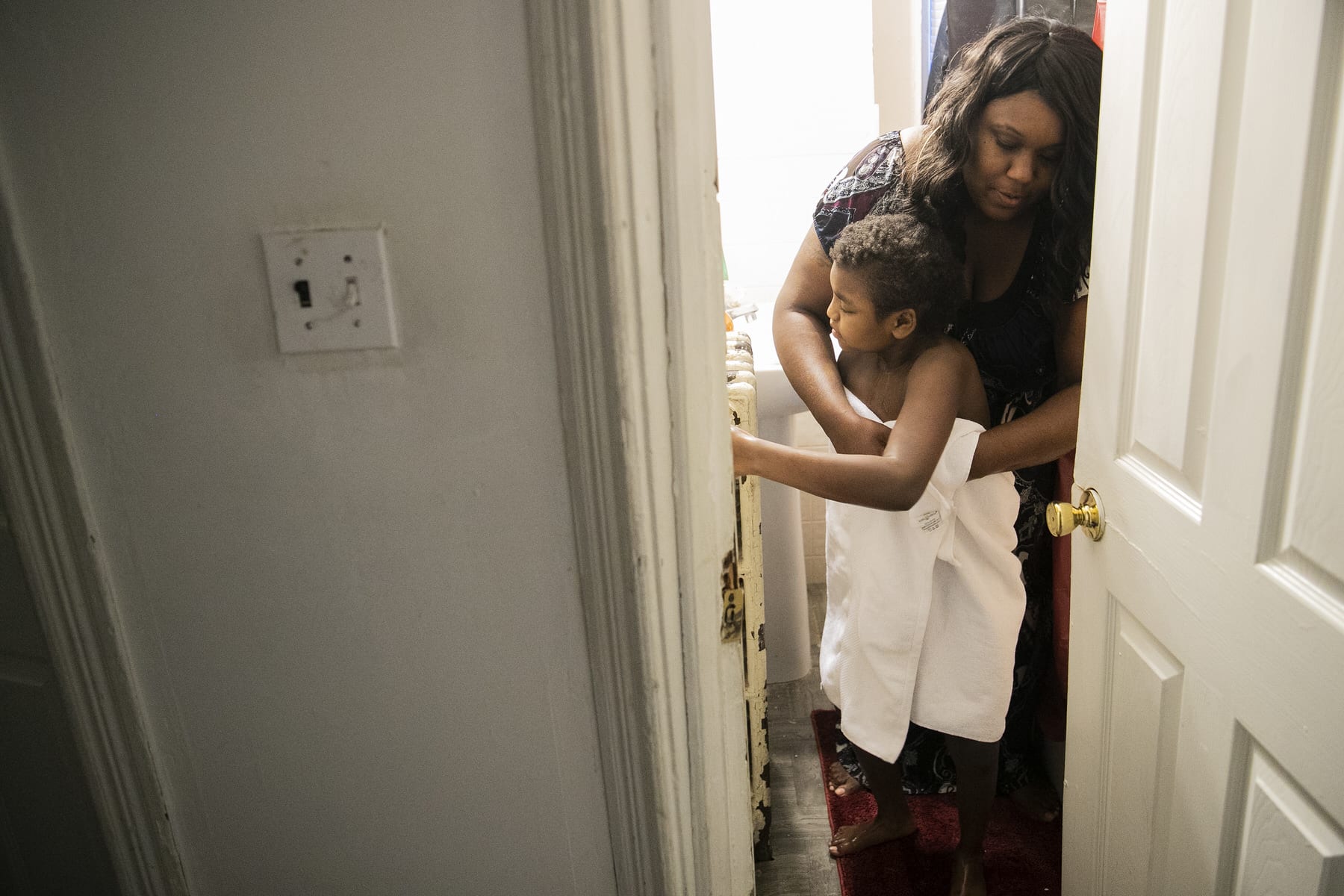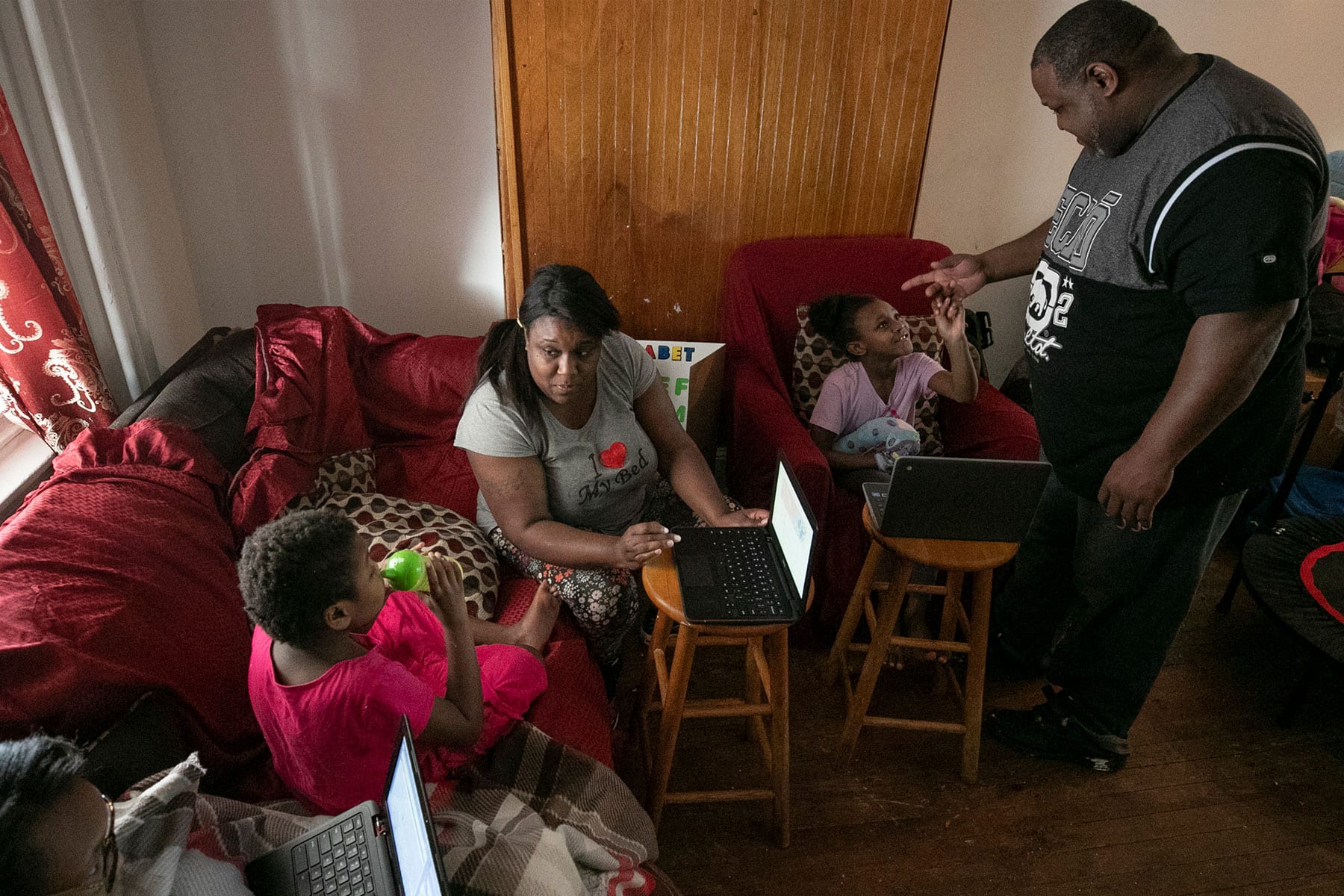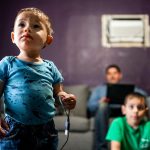The past decade has been a relentless cycle of loss and struggle for the Powers family in West Philadelphia. At times it felt like they couldn’t catch a break.
Syrita and Aaron Powers’ three daughters have special needs, and the youngest two are non-verbal. Their son was born premature in 2009 and died. During the pandemic, Aaron was laid off from his job at a car dealership, and both parents became unemployed. The girls struggled with school. The plumbing broke in their old three-bedroom rowhouse and the roof began leaking into one of the girls’ rooms. The three girls squeezed into the other remaining room.
“As the challenges got more prevalent, we sank deeper into poverty,” said Syrita, 42.
And because their income status fluctuated, they could rarely count on one of the only federal relief programs for parents, the child tax credit, to give them a boost each year. The nation’s poorest families have never qualified for the full amount of the credit — $2,000 per child before this year — because it was designed to support working families who paid income tax.
That changed when Congress passed an expansion of the credit earlier this year. That made the tax credit available to the lowest-income families and expanded the amount available to $3,000 for kids ages 6 to 17 and $3,600 for kids under 6. In addition, instead of an annual lump sum, the money would be distributed monthly in increments of $250 or $300 a month per child depending on the children’s ages.
Those payments begin going out on Thursday to 88 percent of American families with children.
The Powers family will now receive $750 each month — $250 each for Madison, 12; Georgia, 10; and Logan, 8. Syrita views the credit expansion as something that could provide a fundamental, lasting impact in her life and the lives of her children.
“It feels like a hand up — you don’t have to feel like anybody’s project,” Syrita said.
The money could mean big things, like a new house in a new neighborhood, free of leaks and crime and stifling hardship. It could mean small things, like wipes and cream for her two youngest daughters who are incontinent. Things like chair covers for when they have accidents. Things like detergent for the multiple loads of laundry they are washing a day.
Things that preserve their basic human dignity.
Other moms who spoke to The 19th see it as an opportunity to bring down child care costs, enroll their kids in sports, pay for expenses such as diapers, cover outstanding bills that mounted during the pandemic or even afford mental health services.
“We are not really asking for nothing you shouldn’t have,” Syrita said. “It’s not things that you want — it’s things you need.”
That is the promise of the child tax credit. The expansion, if done properly, could cut the child poverty rate in the United States by 45 percent, from 13.6 percent to 7.5 percent, according to a study by the Center on Poverty and Social Policy at Columbia University. It is the first time the country has tried to drive down its poverty rate through direct cash payments in the way other wealthy nations have already done.
That promise hinges on the government’s ability to reach the poorest families, who will have to sign up through a portal created by the Internal Revenue Service to access the money. Nearly 90 percent of families, including Syrita and Aaron Powers, will not have to do anything to begin receiving the checks automatically near the 15th of every month for at least a year. (The expansion was approved for one year, and a lobbying effort is underway to make that expansion permanent).
The policy aims to target the systemic racism that has held people of color back. Half of all Black and Latinx kids will be newly eligible for the credit through the expansion, beginning a ripple effect that studies show ensure better futures — emotionally, physically and financially — when children grow up in financially stable households.
So many of the families who live in poverty don’t have access to the same resources, equipment or opportunities as others— things some people take for granted, like accessible playgrounds or dance classes.
“It always seemed like we got the lesser of things,” Syrita said. “Sometimes I feel people say, ‘This is what you deserve and take this and be quiet.’”
To reach people who may be hearing about the credit for the first time, a massive education campaign has been underway for weeks, with organizations, the White House and members of Congress leading events to tell parents that money is on the way.
The IRS has been working with about 4,000 community groups to get the word out and inform people of what they need to do to get the money if they don’t file taxes. Just last month, the agency debuted a portal for families who have not filed taxes in the past two years and did not receive stimulus checks. Those families, who are not known to the IRS, need to fill out an application to receive the payments.

Barbara Saverino, the director of public policy and advocacy at United Way Worldwide, one of the organizations working on the awareness campaign, said the most effective way to reach those people has been through hyper local organizations that are already embedded with those families.
“The challenge is they might not be connected to us yet. We want to make sure that we do have the ability to connect with them,” she said. “And then also, who is delivering the message? That’s important — having a trusted messenger.”
Community organizations such as Magnolia Mother’s Trust in Mississippi are doing that direct outreach. The trust was created three years ago to give low-income Black mothers direct cash assistance, a way to test a potential national model for providing low-wage people a guaranteed income payment. Through that work, they are already connected with many of the parents who would most benefit from the child tax credit.
Aisha Nyandoro, the executive director of Magnolia Mother’s Trust, said the women she works with are beginning to “dream out loud” about the changes the credit could bring to their lives.
For many, child care is top of mind.
Julie Groce, a mother in a suburb of Flint, Michigan, plans to use the money toward her 3-year-old son Adam’s daycare, which, at $1,000 a month, costs almost as much as her mortgage.
Since moving Adam to his current daycare center during the pandemic from a lower cost one with fewer resources, Groce said her son is thriving. He can name almost every color, count to 10 — sometimes 20 — and he’s excited to go to school every day.
Now, she can consider enrolling him in soccer and save toward buying him a new bed since he’s growing out of his toddler one.
When she considers how much $300 a month will change their lives, she begins to cry.
Groce grew up low-income, sticking out among her classmates in her thrift store clothes. She could never buy books because her parents couldn’t afford them. That won’t be the case for her son.
“I want him to have a better life and a better childhood than what I had, and I feel like that’s going to happen now,” she said.
In New York, single mom Krystal DeFilippo is also looking at the chance to give her 6-year-old, Max, new experiences after a pandemic year that robbed him of so many.
DeFilippo drained her savings during the pandemic to keep them going after the brunch spot where she worked as a server closed through July 2020. When the restaurant reopened with outdoor dining, she was working double shifts through the weekends in blistering heat and, later, piercing cold — snow boots and heavy jackets on, carrying trays with dozens of drinks in the street — to try to make up the earnings. With Max at school during the week, she had to stay home to care for him.
The tax credit will go to paying off the bills, Max’s upcoming school supplies, maybe a trip to the Statue of Liberty.
“I’m very big on giving him everything I didn’t have — he comes before me,” she said. “This money goes to what it’s given for because to me it’s a blessing and you don’t abuse blessings.”
The money, moms said, will flow into financing the support they feel is lacking in the American safety net.
Looking ahead at the start of the child tax credit payments has made moms like Lori Ament in Gilbert, Arizona, consider how different their lives may have been if they’d had this monthly payment before.
Five years ago, when her son Avery was born, Ament plunged into postpartum depression for months. Her job as the manager of a veterinary hospital only covered two weeks of her parental leave, and the 12 weeks she ultimately took were paid by taking out a line of credit against her home.
It wasn’t until her son was about eight months old, after months of sleep deprivation so profound she began to hallucinate, that Ament was finally able to start seeing a therapist. It took their family a year to pay off the loan that allowed her to have three months off with her newborn.
“I have this new monthly allotment to make sure that the health and well-being of my family is provided for,” Ament said. “More than making sure that I can afford daycare for my kid, which is a huge factor, or putting food on the table, which is a huge factor, I also see it as a mental well-being of both the parents and the child.”
So much of the depression Ament felt at the time was fueled by a guilt around the type of parent she felt she was. If she was working to provide for Avery, she wasn’t being present enough. If she wasn’t being present enough, she wasn’t living up to the ideals she set up for herself.
At the time, Ament said she would have used the money to make sure she was getting the help she needed so she could be there for Avery. She imagines new moms this year who will do the same. For her family, Ament plans to use some of the funds for before- and after-school care as Avery enters kindergarten, and for swimming and physical activities that will give him the kind of opportunities she always hoped she could.
She talks about the credit not as a momentary infusion, but a pathway to lasting change. The kind of thing that will chart a new course for her family.
Her son won’t know the struggles she experienced, Ament said, like when her family was homeless for a time when she was around his age. The child tax credit for her means giving him the things she thought five years ago, on the hardest days, she may never be able to provide.
That’ll make a difference for her, too, knowing: “I’m giving that to my kid.”
Some of the power of the child tax credit expansion has been its overwhelming popularity – in Congress and with regular people. Groce, the mom from Michigan, said sometimes it feels like Congress is “so out of touch with the average Joe, but this really feels like they are listening and that is such a win.”
But it wasn’t always popular. The push for its expansion began 18 years ago when Rep. Rosa DeLauro, the Democrat from Connecticut and the current chair of the House Appropriations Committee, started advocating for the credit to be fully available to the poorest families. In those two decades, the issue went from one that she alone was pushing to one that had the support of Democrats in Congress, the president and several high-profile Republicans, including Sen. Mitt Romney of Utah.
It’s also wildly popular with voters, and particularly voters who want to see it become permanent.
President Joe Biden has proposed through his American Families Plan expanding the current dollar amount increase to 2025, and then rewriting the requirements so that the poorest Americans can access it permanently. Advocates want to see more, pushing for the full expansion implemented this year to be permanent for all qualified families.
This week, 50 mothers — one from each state — wrote a letter to the president and vice president pushing for just that.

“While we recognize The American Families Plan would extend that much needed support for a few more years — as moms, we don’t believe this is enough,” they wrote. “The administration has momentum on its side and should use it to make the next big fight a fight on behalf of mothers.”
A poll also released this week by the nonprofit advocacy organization Building Back Together and ALG Research in battleground states, including Florida, Arizona, Georgia and Pennsylvania, found that the child tax credit is the most popular part of the president’s Families’ plan for households with children. About 63 percent of families with kids said they believe the expansion will help them.
Failing to make the expansion permanent, Groce said, would feel like “a slap in the face.”
In a call with reporters on Wednesday, the six members of Congress who have championed the credit — Reps. DeLauro, Suzan DelBene and Ritchie Torres and Sens. Michael Bennet, Sherrod Brown and Cory Booker — said their fight is focused on permanence.
“We have a real opportunity here, not to just throw money at a problem, but to build the architecture for the future [and] use this as the moment to lift up all children and families, so that every person, no matter their background, has the opportunity to contribute and to succeed,” DeLauro said.
As that discussion unfolds, Nyandoro believes the pathway to permanence will be the visibility of the tax credit for families across the economic spectrum. Almost every American family with children will get some form of a payment from the tax credit, which begins to phase out for individuals who earn $75,000 a year and couples who earn $150,000 a year or more.
“We have all of this history that shows that we don’t care what poor people say or need in this country. [But] this has lifted all of us and not just the few,” Nyandoro said. “How we’re going to get to permanency is by truly recognizing that we’re all in the same boat on this one.”
The credit also has the potential of recalibrating how some Americans think of poverty and cash payments. The conversation about a guaranteed income — sending people cash payments, no strings attached — has been a fairly niche one that for years was discarded as too liberal.
But the child tax credit, by another name, is a guaranteed income. It’s cash payments to families with kids, no strings attached.
And yet, Nyandoro said, there continues to be a disconnect about who should have access to something like that. That child tax credit is accepted because it’s for kids, but not adults, she said. There’s a moralism there, and there’s also a question of how far we go as a nation.
Is cutting child poverty in half enough? Nyandoro asked.
“We have to be very honest with ourselves about how we go about viewing poverty, and who we believe is entitled to a good life,” she said. “Why don’t we take the radical steps and the bold steps needed in order to say, ‘We are going to get real about alleviating poverty in this country?’”








